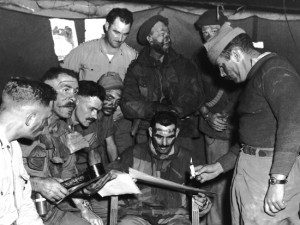
The first time I went to the local chiropractor’s office, I arrived early and got caught up on some National Geographic stories. Then it was time for my session and I prepared myself with excuses. I expected a barrage of questions, such as, how long had my shoulder been bothering me, what previous treatment had I undergone, and why had I waited so long to deal with it. But that wasn’t the first thing Dr. Peter Begg asked me.
“Where did you get all your research for that Vimy book of yours?” he said.
I was so surprised by his choice of icebreaker, that I didn’t quite know what to say. But I quickly recovered and for the next 20 to 30 minutes Peter Begg and I had one of the liveliest discussions about story gathering I’d ever had. I figured it was all a ploy to distract me from the various treatments he tried on my shoulder. Whether it was or not, I realized how much more there was to this chiropractor than just his lengthy professional career and his service to the community.
The next time I arrived as his office, he asked me about the mission in Afghanistan and how it was affecting young Canadian men and women in uniform. The next time I think we solved world political unrest. Or maybe it was world hunger.
Dr. Begg died on Tuesday after battling cancer for many months. And I’ll join many in this community who’ll miss his assistance and advice. But more than that, I’ll miss the man beyond the medical professional. I’ll miss the book, not just its cover.
Ironically, this week, I lost another acquaintance. Much like Dr. Begg, I really only knew Ruth Doble from a few visits, not from a lengthy friendship. One evening a few years ago, my hockey buddy, Ron Doble, (Ruth’s son) and I happened by his mother’s home in Pickering. He introduced me to Ruth, a woman in her early 90s then. Inside her well-kept house, I noticed that everything was in order – neat furnishings, tidy cupboards and a fair number of books around. Because our stop was a short one, I didn’t get the chance to talk to her about those books. Then, last fall, when I spoke to the Pickering Historical Society, among the last to approach me to purchase a book and have it autographed was none other than Ruth Doble.
“I want you to tell me how you write these books,” she announced. An avid supporter of the historical society, I sensed she had probably read her fair share of memoires, biographies and local histories.
“Carefully,” I said in jest. And we talked about our mutual love of researching and reading history. She knew what she liked and what she didn’t like. Mistakenly, however, I saw a woman in her 98th year as merely a reader of history, not the active historical society member she was. Another book whose cover I had clearly misread. Unfortunately, that was our last conversation. Ruth Doble died last Tuesday.
I could recount scores of others whose inner self defied their outer shell – politicians with unique hobbies, sports figures on more than athletic missions, entertainment stars with hearts of gold, and business executives with secret philanthropic interests. One man I remember in particular, Don Nelson, was a commissionaire at the CBC.
One day somebody told me he’d fought in the Korean War. After refusing me several times, he finally consented to an interview. As unlikely as it seemed in 1950, he’d run away from home, joined a U.S. commando unit, and was dropped behind Communist army lines to blow up fuel dumps, disrupt communications and conduct hit-and-run raids. His only weapon was a Bowie knife.
“When I arrived home,” he told me, “there were lots of hugs and kisses from family, but when I dropped my knapsack and the Bowie knife fell out, my father just looked at me. As far as he was concerned, I had dishonoured him.”
Later, Don told me, he presented the knife to his father as a kind of peace offering, but it was refused. It was only following his father’s funeral in 1973, that Don’s mother told him, “We buried it with your father.”
“Buried what?” Don asked. His mother had quietly placed the Bowie knife in Daniel Nelson’s coffin. It was only in death that father and son could be reconciled. Don’s gone now, but I often think about him as two people – the calm CBC commissionaire we all knew on the outside; on the inside, the unhappy veteran whose family never really accepted his wartime service.
Not everybody’s exterior hides such a tempestuous interior. But often there’s so much more than the outer person to know.
Rest in peace Peter. I will never forget the times I spent with you. 🐤🐇🐹🐔💙